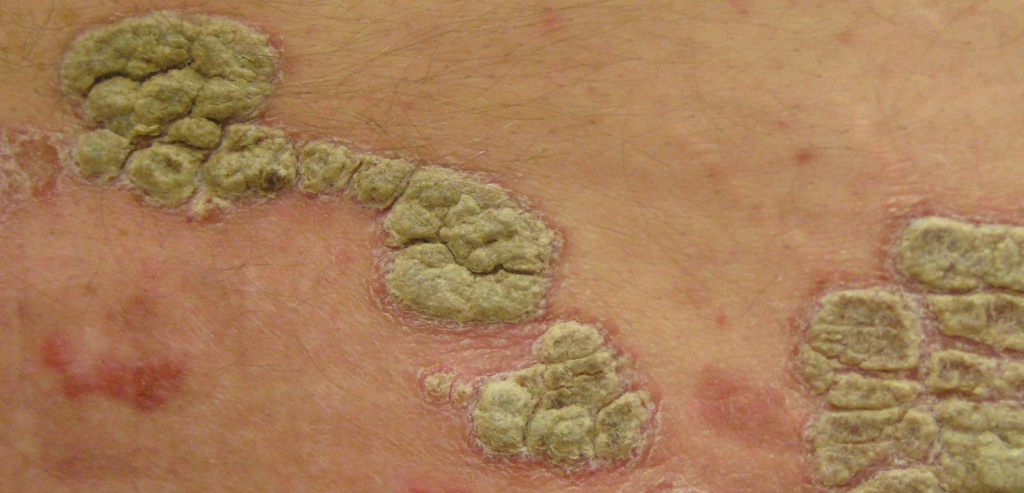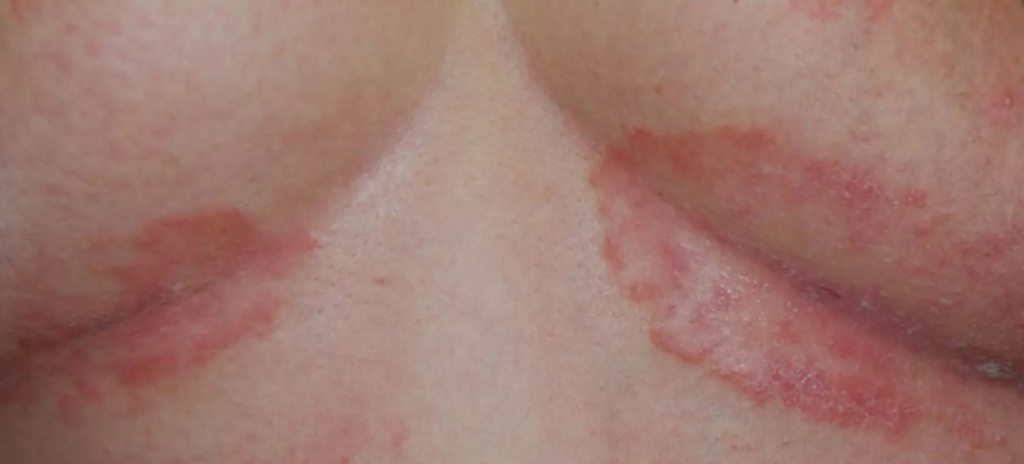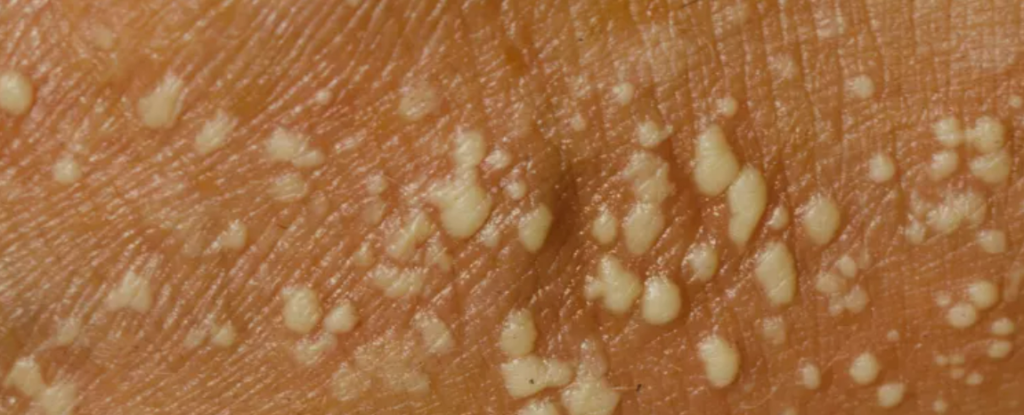Psoriasis is a chronic, immune-mediated inflammatory skin disorder characterized by well-defined, red, scaly plaques. It is a systemic disease with potential involvement of multiple organ systems, primarily affecting the skin and joints. Psoriasis is considered an autoimmune condition in which the immune system mistakenly attacks healthy skin cells, leading to rapid turnover of skin cells and the development of characteristic lesions.

Etiopathogenesis of Psoriasis
The pathogenesis of psoriasis involves complex interactions between genetic, environmental, and immunological factors:
1. Genetic Predisposition: Psoriasis has a strong genetic component, with multiple susceptibility genes identified, including those encoding components of the immune system and skin barrier function.
2. Immune Dysregulation: T lymphocytes, particularly Th1 and Th17 cells, play a central role in the pathogenesis of psoriasis. Dysregulated cytokine signaling, including increased production of tumor necrosis factor-alpha (TNF-α), interleukin-17 (IL-17), and interleukin-23 (IL-23), promotes inflammation and abnormal keratinocyte proliferation.
3. Environmental Triggers: Various environmental factors can exacerbate or trigger psoriasis flares, including stress, infections (e.g., streptococcal pharyngitis), certain medications (e.g., beta-blockers, lithium), smoking, alcohol consumption, and trauma to the skin.
4. Skin Barrier Dysfunction: Impaired skin barrier function due to genetic or environmental factors may contribute to the initiation and perpetuation of psoriatic lesions.
Clinical Manifestations:
Psoriasis can present with a wide spectrum of clinical manifestations, including:
1. Plaque Psoriasis: The most common form, characterized by well-defined, raised, red plaques with silvery-white scales, typically affecting extensor surfaces (elbows, knees), scalp, and lumbosacral region.

2. Guttate Psoriasis: Characterized by small, drop-like lesions scattered over the trunk and limbs, often triggered by streptococcal infections.

3. Inverse Psoriasis: Involves skin folds (e.g., axillae, groin, under the breasts), presenting as smooth, red patches without scales, exacerbated by friction and sweating.

4. Pustular Psoriasis: Manifests as sterile, pustular lesions on erythematous skin, with subtypes including localized, generalized, and palmoplantar pustulosis.

5. Erythrodermic Psoriasis: Rare but severe form involving widespread erythema and scaling of the skin, often associated with systemic symptoms such as fever and malaise.

6. Nail Psoriasis: Causes pitting, discoloration, thickening, and crumbling of nails, which can lead to functional impairment.

Non-pharmacological Management of Psoriasis
Non-pharmacological interventions can help alleviate symptoms, reduce disease severity, and improve quality of life for individuals with psoriasis:
1. Topical Therapies: Emollients and moisturizers can help hydrate the skin and reduce scaling. Topical corticosteroids, vitamin D analogs, calcineurin inhibitors, and tar preparations are commonly used to reduce inflammation and slow keratinocyte proliferation.
2. Phototherapy (Light Therapy): Controlled exposure to ultraviolet (UV) light, either alone or in combination with psoralen (PUVA therapy), can suppress inflammation and reduce the severity of psoriasis lesions.
3. Stress Management: Stress reduction techniques such as relaxation exercises, mindfulness, and stress counseling may help reduce the frequency and severity of psoriasis flares.
4. Avoiding Triggers: Identifying and avoiding known triggers such as certain medications, infections, and skin trauma can help prevent exacerbations of psoriasis.
5. Healthy Lifestyle Practices: Maintaining a balanced diet, regular exercise, adequate sleep, and avoiding smoking and excessive alcohol consumption may have beneficial effects on psoriasis severity.
6. Complementary Therapies: Some individuals may find relief from symptoms with complementary therapies such as acupuncture, herbal remedies, or dietary supplements, although evidence for their efficacy in psoriasis is limited.
Pharmacological Management of Psoriasis
Pharmacological treatments for psoriasis aim to suppress inflammation, normalize keratinocyte proliferation, and alleviate symptoms. Commonly used medications include:
1. Topical Agents:
Corticosteroids: Potent anti-inflammatory agents used to reduce itching, erythema, and scaling.
Vitamin D Analogues: Help regulate keratinocyte proliferation and differentiation, often used in combination with corticosteroids.
Calcineurin Inhibitors: Tacrolimus and pimecrolimus inhibit T-cell activation and are useful for sensitive areas such as the face and intertriginous regions.
2. Systemic Therapies:
Conventional Systemic Agents: Methotrexate, cyclosporine, and acitretin are used for moderate to severe psoriasis unresponsive to topical therapies.
Biologic Agents: Target specific cytokines involved in psoriasis pathogenesis, including TNF-α inhibitors (e.g., adalimumab, etanercept), IL-17 inhibitors (e.g., secukinumab, ixekizumab), and IL-23 inhibitors (e.g., ustekinumab, risankizumab).
Phosphodiesterase-4 (PDE4) Inhibitors: Apremilast modulates intracellular signaling pathways involved in inflammation and is indicated for moderate to severe plaque psoriasis.
3. Oral Retinoids: Acitretin, a systemic retinoid, can be used for severe psoriasis, particularly pustular and erythrodermic variants.
4. Biologic Therapies: Targeted biologic therapies, such as anti-TNF-α, anti-IL-17, and anti-IL-23 agents, have revolutionized the treatment of moderate to severe psoriasis, offering high efficacy and favorable safety profiles.
5. Systemic Immunomodulators: Drugs such as methotrexate, cyclosporine, and mycophenolate mofetil suppress immune-mediated inflammation and are reserved for severe, refractory cases of psoriasis.
Conclusion:
Psoriasis is a chronic inflammatory skin disorder with a multifactorial etiology and diverse clinical manifestations. Management of psoriasis requires a tailored approach based on disease severity, extent, and patient preferences. Non-pharmacological interventions, including topical therapies, phototherapy, stress management, and lifestyle modifications, play important roles in psoriasis management, often complementing pharmacological treatments such as topical agents, systemic therapies, and biologic agents. Close monitoring, regular follow-up, and interdisciplinary collaboration are essential for optimizing outcomes and improving quality of life for individuals living with psoriasis.

